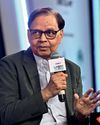
HERE'S A SKETCH OF A SIMPLE MAN'S PROFILE. SON OF A SMALL BUSINESSMAN IN KOLKATA. BROUGHT UP OBSERVING HIS FATHER OPERATING IN THE DUSTY, CROWDED WHOLESALE MARKET OF DAWA BAZAR.
HIS FATHER RAN a small, wholesale medicine shop, where our protagonist, as a child, would read the drug labels and wonder how they were made. What path would such a profile take in life? For any ordinary man, it would mean continuing to run the father's wholesale medicine shop, and living a contented, financially stable yet unremarkable life. But Dilip Shanghvi, 67, is no ordinary man. The child poring through medicine labels decided one fine day to make medicines himself, and became successful, way beyond probably what he himself would have imagined. Sometime in March 2015, Shanghvi, the Founder and Managing Director of India's biggest pharma company, Sun Pharmaceutical Industries Limited, became India's richest man for a brief period, besting Reliance Industries' promoter Mukesh Ambani. He stayed at No. 2 for fairly long, and even today is among the country's 10 richest men.
It is not an appellation he likes to flaunt on his shirt. In fact, quite the opposite. He is distinctly uncomfortable with any reference to his riches, remains intensely work-focussed and introverted, shuns public appearances including press conferences and parties, has a hard time smiling for the cameras, and has a mundane office in a non-fancy location in Mumbai's Goregaon. If his stature has taken anything away, an anecdote from his biography, The Reluctant Billionaire, narrates how his fame ensures he's no longer able to visit a small south Indian restaurant to partake his favourite idli; his friends now deliver the dish to him at home.
And what does such a man do when faced with circumstances that threaten the growth of the business he so fastidiously built? He fights. In his own, low-profile, yet stubborn and determined fashion.
This story is from the {{IssueName}} edition of {{MagazineName}}.
Start your 7-day Magzter GOLD free trial to access thousands of curated premium stories, and 9,000+ magazines and newspapers.
Already a subscriber ? Sign In
This story is from the {{IssueName}} edition of {{MagazineName}}.
Start your 7-day Magzter GOLD free trial to access thousands of curated premium stories, and 9,000+ magazines and newspapers.
Already a subscriber? Sign In

"Do what's best for employees"
BEST ADVICE - PANKAJ JATHAR | CEO | NIIT LTD

Your Palate for 2025
What's in store for you in the New Year when you go out for a meal or a drink? We ask industry experts to predict F&B trends for 2025

"RBI'S STANCE SHOULD BE TO KEEP THE RUPEE MORE VOLATILE"
Axis Bank Chief Economist Neelkanth Mishra talks about the rupee, quantitative easing, the Trump impact, and more

"We should strive towards two non-zero GST rates"
Arvind Panagariya, Chairman of the 16th Finance Commission, on further reforms in the economy, the Nehruvian era and its impact on policymaking, cash transfers, and more

A GENERATION MAROONED
This generation is creating new grammar for social and professional existence. They are reimagining the very concept of work, identity, and social belonging

A TIME OF UNCERTAINTY AND OPPORTUNITY
A look at the key trends that will redefine how content will be created, distributed, and consumed

Consciousness Shaping Consumption
India has a dynamic and discerning consumer base, whose consumption pattern is experiencing a significant transformation

THE NIFTY ELEPHANTS
The composition of the Nifty 50 index has undergone notable changes in the past 30 years, with only 11 companies consistently remaining in the index. It is expected to undergo further changes in 2025 with the entry of new-age companies like Zomato

REDEFINING THE DIGITAL AGE
For Bitcoin, its future lies not as a currency but as a cornerstone of the modern financial ecosystem

THE FUTURE OF HEALTHCARE
As AI advances, so will its role in health insurance. In the future, it shall perform a variety of complex tasks, making it more accessible and aligned with individual needs